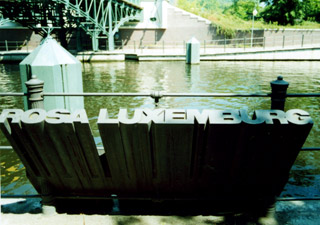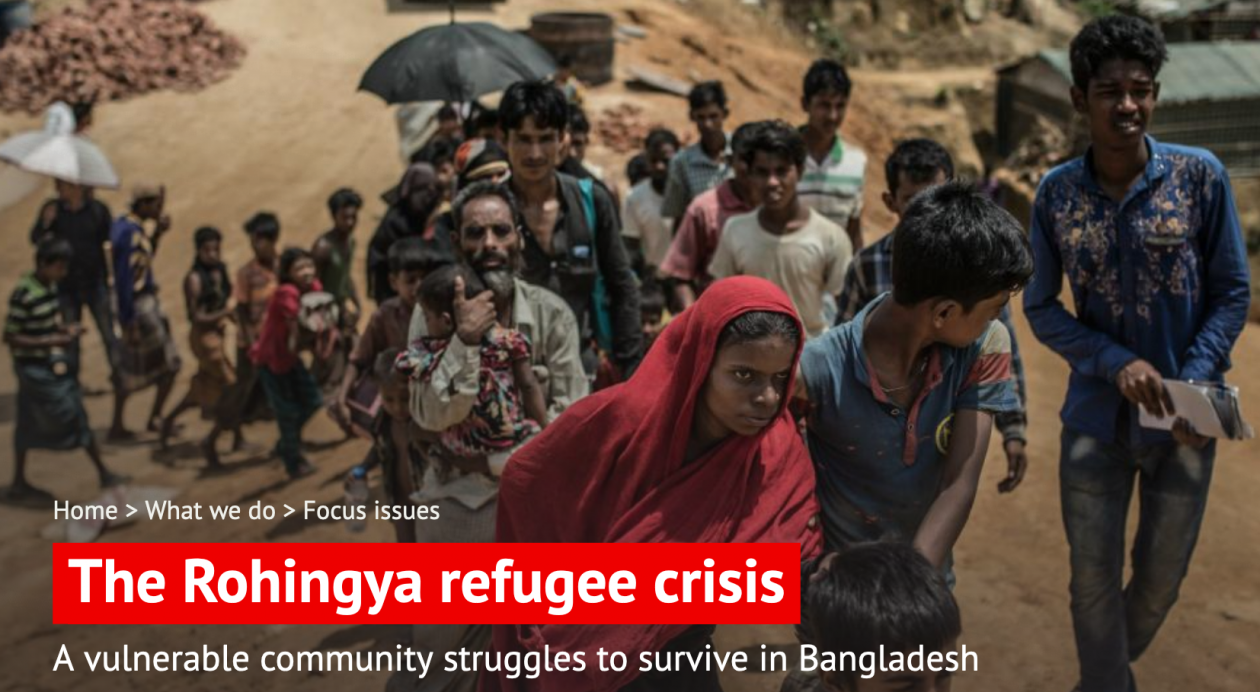Roger Cohen is in Berlin and has just posted in the Times: Wellness Trumps Politics
It’s a sunny Sunday afternoon on the first day of June. “Couples,” Roger says, “lounge in the grass beside the Landwehr Canal in the Tiergarten, jugglers perform, kids on bikes in bright helmets zigzag through the throng.”
And then, what does Roger, see just a bit back from the water, “a small memorial to Rosa  Luxemburg, the socialist revolutionary murdered and thrown into the canal in 1919 by rightist paramilitaries…. The murder presaged two decades in which Germany would be the crucible of a fierce struggle between left and right, Marxism and Fascism.”
Luxemburg, the socialist revolutionary murdered and thrown into the canal in 1919 by rightist paramilitaries…. The murder presaged two decades in which Germany would be the crucible of a fierce struggle between left and right, Marxism and Fascism.”
Roger concludes that, “Wellness trumps Politics,” or even better, that “the political center has given way to the personal century.”
But was the Twentieth Century the political century? Rosa Luxemburg being murdered and thrown into the canal suggests a different story. Was it all about politics, about Marxism and Fascism? I don’t think so. For me the 20th. century was the terrible century, the worst ever in regard to the (absent) respect for human beings and human rights. It was the century of world wars and the slaughter of millions of innocents, either caught in between opposing factions, or caught and imprisoned and then too often murdered by one or the other faction.
Perhaps it was, as Roger affirms, that somehow politics led the way. When was it, in August of 1914, when the terrible events of the next 50 years or more got started. The politics of communism and fascism certainly had their followers, but the so-called followers, tens of thousands, if not millions of them, quickly became foot soldiers in the wars.
While politics may have got things started what was started, mass murder and the slaughter of innocents, very soon had no recognizable tie or connection to the political beliefs that may have been there at one time. Instead what quickly happened was that the entire century became one more example of the moral of Jean de la Fontaine’s Fable du loup and l’agneau, — La raison du plus fort est toujours la meilleure.
Yet, as I think more about what Roger says, it does seem, just as Roger notices about Berlin, on this sunny June afternoon, apparently without a care in the world, that it may very well be that the personal has trumped politics in the 21st century. Or at least the wars and boucheries of the past are no more. And ISIS just a bad dream?
The Rosa Luxemburg Memorial
At the edge of the Tiergarten is an unusual path, the Katharina-Heinroth-Ufer and the Gartenufer, which joins it in the North West and runs between the southern bank of the Landwehr Canal and the bordering Zoologischer Gar ten.
ten.
The exit is closed at dusk, at 9 p.m. at the latest. During the day, however, many walkers are attracted by the exotic sounds and by a clear view of the animals without having to pay. Right under Lichtensteinbrücke (Lichtenstein Bridge) one encounters the dramatic and unexpected sight of a massive cast-iron plate that has been installed as if it is about to slide into the water. On it, the name of Rosa Luxemburg appears in raised capital letters. It marks the spot where the murdered revolutionary was thrown into the canal.
Le Loup et l’Agneau
La raison du plus fort est toujours la meilleure
Nous l’allons montrer tout à l’heure.
Un Agneau se désaltérait
Un Loup survient à jeun qui cherchait aventure,
Et que la faim en ces lieux attirait.
Qui te rend si hardi de troubler mon breuvage ?
Dit cet animal plein de rage :
Tu seras châtié de ta témérité.
– Sire, répond l’Agneau, que votre Majesté
Ne se mette pas en colère ;
Mais plutôt qu’elle considère
Que je me vas désaltérant
Dans le courant,
Plus de vingt pas au-dessous d’Elle,
Et que par conséquent, en aucune façon,
Je ne puis troubler sa boisson.
– Tu la troubles, reprit cette bête cruelle,
Et je sais que de moi tu médis l’an passé.
– Comment l’aurais-je fait si je n’étais pas né ?
Reprit l’Agneau, je tette encor ma mère.
– Si ce n’est toi, c’est donc ton frère.
– Je n’en ai point. – C’est donc quelqu’un des tiens :
Car vous ne m’épargnez guère,
Vous, vos bergers, et vos chiens.
On me l’a dit : il faut que je me venge.
Là-dessus, au fond des forêts
Le Loup l’emporte, et puis le mange,
Sans autre forme de procès.
